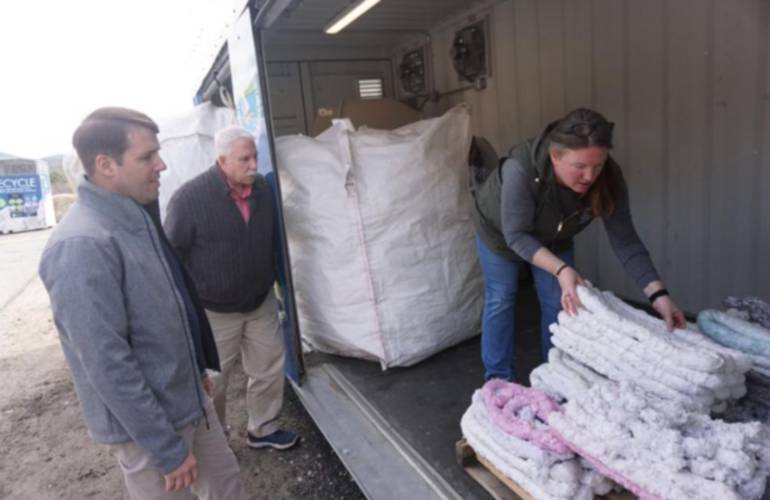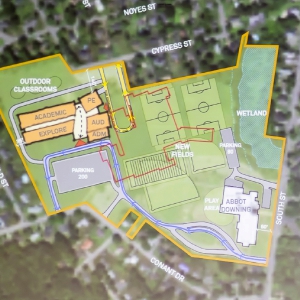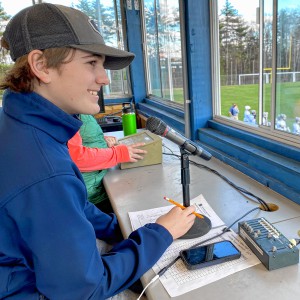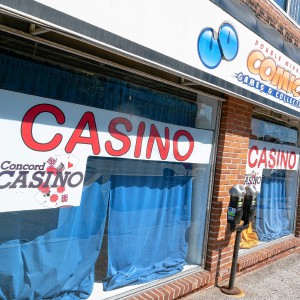Gilford's novel foam recycling program gets funding boost

Rep. Chris Pappas, left, attended a presentation in Gilford on April 2. Gilford Department of Public Works Director Meghan Theriault, right, handles the finished product of densified foam as Town Administrator Scott Dunn looks on. The foam recycling program is the first in the state. Gabriel Perry—The Laconia Daily Sun photo
| Published: 04-10-2024 10:30 AM |
Congressman Chris Pappas (D-NH) highlighted the importance of supporting sustainable development after touring the state's only polystyrene recycling facility last week. The transfer station recently received a $54,000 grant from the Northern Border Regional Commission.
Theriault demonstrated the machinery that compresses massive bags of foam into tidy blocks which are sold to plastics companies and used to create insulation, molding and other items on April 2.
The total cost of the program is $108,000 and the Town of Gilford received an initial $50,000 grant from the Foam Recycling Coalition toward the purchase of a machine last summer. The unit itself costs about $80,000. Running an electrical connection to the unit cost about $5,500 to complete and the rest of the funds purchased four collection bins, reusable bags and two long storage containers for loose foam.
The grant was appropriated to the facility as part of the 2023 pool of Catalyst Grant Awards from the commission, which dispensed $43.6 million including $20 million for the Bipartisan Infrastructure Law.
“We always look at what the Northern Borders commission is able to invest in, in New Hampshire, and we have been looking at how we get more funding into that program because it meets a lot of different community needs across the state,” Pappas said. “This was, I think, an innovative project identified by the local community and they were looking for funding and there was a great match.”
Theriault started the program less than two years ago. It's currently the only facility in New Hampshire capable of handling polystyrene recycling.
“We opened in 2020, so the town actually went from single-stream recycling, which was starting to cost a ton of money, to a source-separated site,” Theriault said. “Recycled cardboard, mixed paper, aluminum cans and glass.”
The facility serves as a recycling hub for the region, and although the commercial recycling of foam is not yet available, Theriault wants to explore its feasibility.
Article continues after...
Yesterday's Most Read Articles
 Hometown Heroes: Couple’s sunflower fields in Concord reconnects the community to farming
Hometown Heroes: Couple’s sunflower fields in Concord reconnects the community to farming
 Boscawen resident takes issue with proposed town flag designs
Boscawen resident takes issue with proposed town flag designs
 Skepticism turns to enthusiasm: Concord Police welcome new social worker
Skepticism turns to enthusiasm: Concord Police welcome new social worker
 With new plan for multi-language learners, Concord School District shifts support for New American students
With new plan for multi-language learners, Concord School District shifts support for New American students
 With Concord down to one movie theater, is there a future to cinema-going?
With Concord down to one movie theater, is there a future to cinema-going?
 Opinion: The Concord School Board can restore trust with residents
Opinion: The Concord School Board can restore trust with residents
“The feedback from opening the facility has been hugely positive. (Residents) used to have to go to Laconia and use their system and process over there, and they love being able to come here and all the options for recycling here,” she said. "It’s kind of a one-stop shop, they can bring their ACs and refrigerators, their electronics — we recycle everything."
Recycling employees gather massive quantities of polystyrene waste into large, hard plastic bags and feed a piece at a time by hand into a machine. The process then melts and compacts the foam into small plastic logs. The logs are molded into squares and stacked into pallets before being transported.
This process solved the main issue regarding polystyrene recycling — the transportation expense. The foam is 99% air, Theriault explained, and it takes up a lot of space making it inefficient – therefore expensive – to transport by truck. Densifying the waste through this process erased that problem and changed the landscape of recycling in New Hampshire.
“There was nowhere for Styrofoam to go. It has a recycling symbol on it, it says it’s recyclable, but nobody can take it because it’s not cost-effective to transport it, because it’s so lightweight and it takes up so much room that hauling would cost so much to transport it,” she said. “What made it reasonable to do is it’s not just for Gilford, it’s a regional program. So we accept from anywhere because there’s nowhere in New Hampshire you can recycle your foam right now — this is it.”
The Gilford facility is critical link in a burgeoning network. Communities bring their polystyrene to be recycled, reducing roadside litter and pressure on landfills.
“This whole program, we call it a hub-and-spoke system. We’re the hub, and the spokes are all the communities. They’re allowed to collect in a variety of ways,” she said. “They can hold a collection event once a year, three times a year. They can collect at their transfer station with a window just like any other recycling. Or they can get a bin, like the clothing bins, the book bins, those kind of bins, and they can collect there.”
The program is a source of net revenue for Gilford, which was a big part of the reason Theriault wanted to make it a reality.
“Once it’s here we’ll densify it down and then we sell the densified foam to a company who then recycles it. And they turn it into picture frames, molding, foam insulation," she said. “We make revenue on it, it’s pretty good in comparison to the other products. It’s less than aluminum but more than everything else, about $700-$900 a ton.”
Pappas said the program serves as a strong example of what can be done when communities have good ideas and the government can leverage funding to make them a reality.
“We just wanted to hear more about this because, as we heard today, potentially other communities might want to adopt this, and it also helps tell the story about the significance that Northern Borders funding has in New Hampshire,” he said. “This is really just an innovative idea that’s helping to reduce waste, recycle a product that everyone sees in their day-to-day lives and does it in a way that is cutting costs for a town in terms of their budget.”
The program also serves as a model to promote sustainable development throughout the Granite State, Pappas said.
"What I’ve found is that people are looking to do the right things in their communities, whether it’s recycling, whether it is reducing carbon footprint, whether it’s lowering emissions. ... So this is just one small step that a community has taken but they’re partnering with a number of other towns from across New Hampshire that are sending Styrofoam waste here to this facility to be recycled,” he said. “Clearly, as people learn about this, I think there’s going to be interest in setting up other locations around the state.”
The success of the program could entice more communities to participate, which is a goal of his, Pappas said.
“This is an example of a great idea from community members here in Gilford that we can then take to the broader population in New Hampshire, and people I think will want to participate in stuff like this,” he said. “So I just think it’s a win-win and the grant funding they receive from Northern Borders is really an investment in this case that is helping to reduce waste and cost.”


 Voice of the Pride: Merrimack Valley sophomore Nick Gelinas never misses a game
Voice of the Pride: Merrimack Valley sophomore Nick Gelinas never misses a game With less than three months left, Concord Casino hasn’t found a buyer
With less than three months left, Concord Casino hasn’t found a buyer Kearsarge Middle School drone team headed to West Virginia competition
Kearsarge Middle School drone team headed to West Virginia competition Phenix Hall, Christ the King food pantry, rail trail on Concord planning board’s agenda
Phenix Hall, Christ the King food pantry, rail trail on Concord planning board’s agenda
